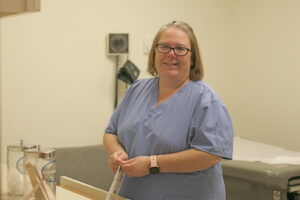Starting therapy for mental health needs can seem like a giant step. Lots of people don’t know where to begin or who to talk to and continue to suffer in silence. That does not have to be you. The staff at the Barbour Community Health Association understands that starting therapy can be difficult but we’re here to help you on your mental health journey. That’s why we’re sharing our five best tips to remember when beginning therapy.
 I don’t know where to start.
I don’t know where to start.
1. Talk to your Primary Care Provider (PCP) or reach out to a Mental Health Provider
You see your primary care provider for all health concerns, remember that your mental and emotional health are just as important when achieving overall health and wellness. Bring up mental health concerns during regular check-ups or visits and check-in with your PCP about your mental health regularly.
If you feel uncomfortable or unsure about approaching your PCP, call or check-in with a mental health provider that you trust. Bridging the gap and having clear and open communication with your PCP or Mental Health Provider is the first step to getting and receiving the care you need.
Mental health is an integral part of health care. In many health care settings today, you may be asked if you’re feeling anxious or depressed, or if you have had recent thoughts of suicide. Take this opportunity to talk to your PCP or Mental Health Provider openly so they can help refer you to a Mental Health Specialist in your area. You also can visit the National Institute of Mental Health’s Find Help page for assistance with finding a health care provider or treatment that’s right for you.
I’m not prepared or don’t know what to say.
2. Prepare before your visit
When in an appointment setting, many people forget questions or concerns they wanted to discuss with their care provider. Think of your questions or concerns beforehand, and write them down and bring them with you when you go to your next appointment. It’s also good practice to prepare a list of any medications you are currently on. It’s important to tell your health care provider about all the medications you’re taking on a regular basis, including over-the-counter (nonprescription) drugs, herbal remedies, vitamins, and supplements because they can affect the way your body reacts to certain medications.
Remember to also review your family health history with your provider. Certain mental illnesses tend to run in families, and having a close relative with mental health needs could mean you’re at a higher risk for some of those concerns. It also can help your health care provider recommend actions for reducing your risk and enable both you and your provider to look for early warning signs.
I feel alone.
3. Consider bringing a relative or close friend to your appointment
Sometimes it’s helpful to bring a close friend or relative that you trust to your appointment. It can be difficult to absorb all the information your health care provider shares, especially if you are not feeling well. Your companion can be there for support, help you take notes, and remember what you and the provider discussed. They also might be able to offer input to your provider about how they think you’re doing.
I’m not sure if I have any mental health needs.
4. Be honest with your providers
Your health care provider can help you get better only if you have clear and honest communication. It is important to remember that communications between you and a health care provider are private and confidential and cannot be shared with anyone without your expressed permission. Describe all your symptoms with your provider, and be specific about when they started, how severe they are, and how often they occur. You also should share any major stresses or recent life changes that could be triggering symptoms.
Examples of symptoms include:
● Persistent sadness, anxiousness, or “empty” moods
● Feelings of hopelessness or pessimism
● Irritability
● Feelings of guilt, worthlessness, or helplessness
● Loss of interest or pleasure in hobbies and activities
● Decreased energy or fatigue
● Moving or talking more slowly
● Feeling restless or having trouble sitting still
● Difficulty concentrating, remembering, or making decisions
● Unusual sleep patterns including difficulty sleeping, early-morning awakening, or oversleeping
● Appetite or weight changes (or both)
● Thoughts of death or suicide, or suicide attempts
● Aches or pains, headaches, cramps, or digestive problems without a clear physical cause
I’m not sure if this treatment plan is right for me.
5. Ask questions and stay informed
If you have questions or even doubts about a diagnosis or treatment your health care provider gives, ask for more information and discuss your concerns with your providers. If your provider suggests a treatment you’re not comfortable or familiar with, express your worries and ask if there are other options. It’s okay to disagree with your provider on what treatment to try. You may decide to try a combination of different approaches. You may also want to get another opinion from a different health care provider, which is okay. It’s important to remember that there is no “one-size-fits-all” treatment. You may need to try a few different treatments, or a combination of treatments, before finding one that works best for you.
Taking care of your mental and emotional health is just as important—if not more important—when taking care of yourself. Beginning therapy can seem like a big task but remember to give yourself credit for taking the leap into mental wellness.
Start the conversation today by calling our Behavioral Health team at 304.823.4000.


 I don’t know where to start.
I don’t know where to start.